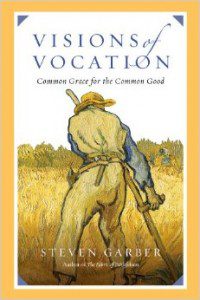 This excerpt from Steve Garber’s book Visions of Vocation is reprinted here with the kind permission of InterVarsity Press. Stay tuned as we continue to occasionally publish excerpts from the book here at Visions of Vocation the blog. And get the book from IVP at this link!
This excerpt from Steve Garber’s book Visions of Vocation is reprinted here with the kind permission of InterVarsity Press. Stay tuned as we continue to occasionally publish excerpts from the book here at Visions of Vocation the blog. And get the book from IVP at this link!
For years, I thought that the Gospel of John was the least accessible and the most mysterious of the Gospels, and I stayed away. But then I read it again, with more of life lived, and read and re-read it over ten years, going further in and further up into the story of the Word becoming flesh and living for a while among us.
What became clear over time was that chapter after chapter, conversation upon conversation, was one more window into that reality. The Word was becoming flesh, again and again. Come and see. In the first chapter of John, the Word becomes flesh, and we read of Jesus taking up his vocation among the people of first-century Palestine. Walking the roads, entering the villages, meeting people, his first words are, “Come and see.”
And in fact in the first two conversations he has, “come and see” is his response to those who want to know him. We have their names, first Andrew the brother of Simon, and then Philip and Nathanael. Attentive, intrigued, they ask their questions , wanting to understand more, and Jesus simply says, “Come and see.” Good books have been written about the nature of the incarnation, and more will be. It is not a small thing to get it right. What does it mean that God enters into history in the person of Jesus?
The Abrahamic religions have several central truths in common, but at this point of God becoming flesh there are deep divisions. “Not for a moment,” Judaism protests, arguing instead that God is one— even as they still hope for a Messiah, someday and sometime. And while Islam believes that there was a great prophet named Jesus, it is incensed at the idea of incarnation. Pushing the boundaries into the pluralizing world at large, those who call themselves atheists and pantheists do not believe that an incarnation of God happened in history. And yet it is the heart of mere Christianity. But if that is the central reality of Christian faith, come and see is profoundly instructive. We do not learn the deepest lessons any other way. Moral meaning is always learned in apprenticeship, in seeing over-the-shoulder and through-the -heart of those who have gone before us, of those who have something to teach us. Theologian Stanley Hauerwas maintains that we learn brick laying only through apprenticeship, just as we learn to hope only through apprenticeship—and he is right. We do not learn anything that matters any other way.
Taken from Visions of Vocation by Steven Garber. Copyright (c) 2014 by Steven Garber. Used by permission of InterVarsity Press, P.O. Box 1400, Downers Grove, IL 60515-1426. www.ivpress.com











